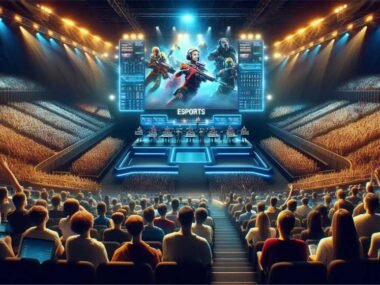You may have heard the term Z. This is the modern generation that is based on the digital environment and grew up on it. For them, fame is not about fame in traditional media or celebrity culture, but about pixels, platforms, and performances at esports tournaments. This new generation is redefining the concept of celebrity through the lens of competitive gaming, where skills, authenticity, and digital presence are important. In their minds, fame is no longer limited to Hollywood or sports arenas, but finds its icons on Twitch streams and esports arenas. In this article, we will tell you how the digital generation has created an ecosystem with its own rules of fame, and how the gaming industry is fuelling this shift.
Esports as the New Arena of Fame
For Generation Z, esports has become akin to sports and a real cultural phenomenon. Almost every representative of this generation is interested in competitive gaming, follows EGW news and roots for their favourite players in such esports disciplines as Dota 2, CS2 or League of Legends. For them, competitive gaming is not only entertainment, but also a platform for self-realisation and a way to achieve public recognition. These games are based on ranking systems, tournaments, and global events that are widely broadcast and viewed by millions of people, mostly other Generation Z viewers. For some, it is an obscure industry, but for this generation, it is more interesting than sports.
What makes fame in esports unique is that it is deeply interactive and skill-based. Unlike traditional celebrities, where fame can be based on looks, connections, or media coverage, fame in competitive gaming is transparent: it is earned on the leaderboard and through consistent performance. The situation is similar in sports, where professional players do not need to be in good physical shape, so they train their skills. Professional players and streamers interact with their audiences on a daily basis, building real-time parasocial relationships that can be even stronger than those of mainstream celebrities.
Social Platforms and the Rise of the Gaming Influencer
The best platforms for gaining digital fame are undoubtedly Twitch, YouTube and TikTok. Generation Z gaming influencers spend a lot of time on them, broadcasting gameplay or their own lives. However, they are known not only for their gameplay – they are also artists, commentators, and sometimes activists. If you are a gamer, you know players such as TenZ, Ninja or Kyedae, who have gained a huge number of subscribers through daily interaction with fans and demonstrating their skills in streams. Their fame is no accident, but a unique combination of skills and creativity.
In this dynamic environment, gaming platforms are key. Don`t forget about gaming news coverage is just as important, as it extends the reach and popularity of these figures. Moreover, players and fans are interested in analytics, tournament and event coverage, and streamers are also present here. They help the audience follow their favourite teams and stars. With the help of digital sources, professional players have a closer connection with fans, increasing their popularity.
Gaming influencers often start small—streaming to a handful of viewers—but consistency and authenticity often lead to viral moments or breakout tournaments that launch them into the spotlight. Fame here is community-driven, algorithm-boosted, and performance-enhanced.
Authenticity Over Perfection: Gen Z’s New Standard
Unlike millennials and older generations, who worked mostly on polishing their ideal image, Generation Z relies on sincerity. This is especially evident in the way gamers present themselves: they often escape from simple conditions, openly discuss mental health issues, and do not hide either their triumphs or failures. This sincere and uncensored approach stands in stark contrast to the idealised and carefully crafted content of traditional social media and appeals to modern audiences.
In esports, this authenticity is becoming an important element. Fans can observe the learning curve, frustrations, game wins, and even burnout. This shared experience builds a deeper emotional connection, making fame seem earned and deserved rather than promotional. This is one of the reasons why an open approach in this industry is rewarded.
Moreover, the lines between fan and creator are blurred. Gen Z gamers often interact directly with fans during streams, play matches with them, or respond to comments in real time. Fame is no longer a distant or unattainable status—it’s participatory.
 Redefining Success and Role Models
Redefining Success and Role Models
Generation Z is redefining the concept of success. For them, it is no longer necessarily a prestigious contract with Netflix or a Grammy Award, but, for example, joining a professional esports team, getting into the top 100 players, or a video with highlights that has received millions of views. Thanks to competitive gaming, it is possible to achieve recognition only through ability and perseverance – regardless of social status, physical abilities or background.
Not surprisingly, the new generation has new role models. Instead of actors or pop stars, Generation Z looks up to professional gamers, analysts, commentators, and even community moderators. Fans try to play in a similar style, wear similar clothes, and buy the same gaming cosmetics. Famous figures in the gaming industry often share their journey from casual gamer to public figure, offering a roadmap, so fans are inspired by them.
Gaming organisations are similar to traditional sports teams and function similarly to talent agencies, helping players develop their brand, attract sponsors and maintain performance. Many also offer mental health support, nutritional counselling and media training. This professionalisation further legitimises competitive gaming as a career path and a means to fame.
Conclusion
In this article, you’ve learned who Generation Z is and what fame means to them. Through competitive gaming (eSports), they have created an ecosystem where fame differs from the traditional definition and prioritises skill, community and authenticity over glitz and glamour. Their stars are born in digital arenas, nurtured through social media and have an audience of millions who watch for entertainment and a sense of engagement. The glory of tomorrow in the gaming industry is not glossy magazine covers, but pings on Discord, raids on Twitch, and victories in esports tournaments.










